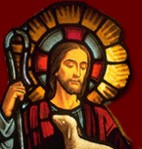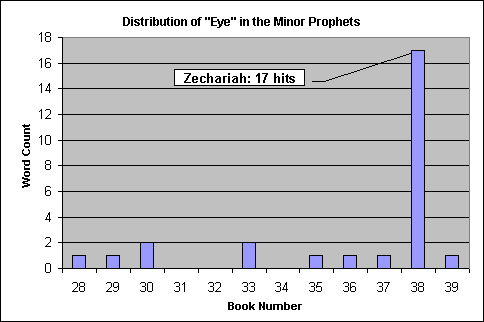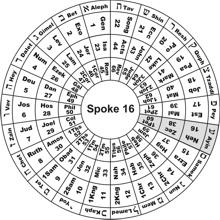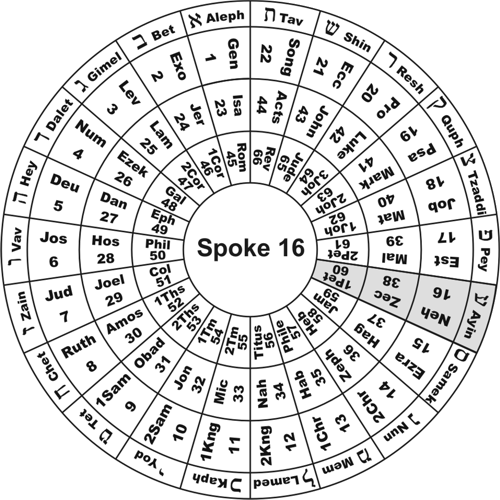Spoke 16 - Ayin - The Chief Shepherd
Feed the flock of
God which is among you, taking the oversight
thereof, not by constraint, but willingly; not for filthy lucre,
but of a ready mind; Neither as being lords over God's heritage, but being
ensamples to the flock. And when the chief Shepherd
shall appear, ye shall receive a crown of glory that fadeth
not away.
1 Peter 5:1ff (Spoke 16, Cycle 3)

The Good Shepherd |
Themes based on the Eye, Vision, Sight, Oversight, Shepherds, and Bishops
dominate Spoke 16. In particular, it is in 1 Peter
that we read of Jesus as our Chief Shepherd
and the Shepherd and Bishop
of our souls.
The divine intent is particularly evident in that
these themes appear in 1 Peter but not II Peter, the latter being
supernaturally linked with Malachi and the coming of the Lord!
The word translated as "bishop" in the quote above is
επισκοποϛ(episkopos), from the roots epi (upon/over) and skopos
(examine/look). This is origin of the name of the Episcopal Church which
is governed by a counsel of Bishops or Overseers. The root skopos is familiar
through the many English words based on it, such as
telescope, microscope and periscope. The one thing all these words have in
common is the idea of vision, sight. Klein traces the
root of the English bishop to the Greek episkopos via the Middle English
biscop, which represents a sort of a phonetic midpoint between the two.
 In Hebrew, the word for a "Shepherd" is
רעה (Ro'eh), from the verbal root meaning
to feed. This manifests in the "Ayin" verse of the alphabet
Psalm 145 which says: "The eyes of all wait upon thee; and thou
givest them their meat in due season." Thus Peter
received of the Lord the thrice-repeated command "Feed my
sheep." The root ra'ah is variously translated as
feed, shepherd, pastor, or herdman. It implies a close
familiarity, hence a friend, as discussed on Spoke 3 in relation to the Holy Spirit.
As with other fundamental words such as
אב (Av, Father) and
בן (Ben, Son), the meaning of this word is
easily understood by analyzing its constituent letters, (see above): In Hebrew, the word for a "Shepherd" is
רעה (Ro'eh), from the verbal root meaning
to feed. This manifests in the "Ayin" verse of the alphabet
Psalm 145 which says: "The eyes of all wait upon thee; and thou
givest them their meat in due season." Thus Peter
received of the Lord the thrice-repeated command "Feed my
sheep." The root ra'ah is variously translated as
feed, shepherd, pastor, or herdman. It implies a close
familiarity, hence a friend, as discussed on Spoke 3 in relation to the Holy Spirit.
As with other fundamental words such as
אב (Av, Father) and
בן (Ben, Son), the meaning of this word is
easily understood by analyzing its constituent letters, (see above):
רעה (Ro'eh, Shepherd)
= ה (Hey, Behold)
. ע (Ayin, Eye)
. ר (Resh, Head/Chief)
In plain English, the Shepherd represents the Chief Eye,
Head Eye or the Eye of the Leader.
This understanding coincides
almost exactly with Dr. Frank Seekins analysis, the only
variations being his understanding of Resh as a symbol of a Person (because it means Head) and
Heh as a symbol of a "window" so he
understands the "Shepherd" as "a person looking out of the window, or as one who watches intently"
Hebrew Word Pictures (pg. 1).
In light of God as the
true Head and Chief, Who Himself has declared "I am the first (Roshon)",
this sacred word reveals God as our omniscient, all seeing
Shepherd. This is all integrated with the geometric structure of the Wheel. The graph
below shows the distribution density (hits per verse) of the word shepherd on the Wheel:

This graph simply displays what is obvious to anyone who reads Scripture - Zechariah and I Peter are
profoundly integrated around the common theme of the Shepherd. The fact that Peter himself was the
chief shepherd, who was always listed first amongst the disciples, shines with extra light as we
behold his first epistle placed here on Spoke 16 by God Himself.
Peter's exhortation against the
fleecing of the God's flock found in the verse at the head of this
section, is echoed in Zechariah on Cycle 2 of
Spoke 16:
Thus saith the LORD my God; Feed the
flock of the slaughter; Whose possessors slay them, and hold themselves
not guilty: and they that sell them say, Blessed be the LORD; for
I am rich: and their own shepherds pity them
not.
Zechariah 11:4 (Spoke 16, Cycle 2)
These verses are linked not only thematically, but also by the by the
link set ("Feed the flock of") [Verify] which is
found only on Spoke 16 in the books of Zechariah and 1 Peter:
 | Spoke 16 KeyLink: 'Feed the flock of ...' | Zechariah 1 Peter 1 Peter |
This is the incredible work of God: not only is each
Spoke differentiated from all others by unique KeySets, but the content of
the KeySets integrates with the theme of the each Spoke and the meaning of
the Hebrew letter governing it!
The theme of the Shepherd saturates
Spoke 16. As Jesus approached His hour of trial, he revealed that
Zechariah was speaking of Him when he said:
Awake, O sword, against
my shepherd, and
against the man that is my fellow, saith the LORD of hosts: smite the
shepherd, and the sheep shall be scattered: and I will turn
mine hand upon the little ones.
Zechariah 13:7 (Spoke 16, Cycle 2)
As discussed in The Great Cloud of
Witnesses, the scattering of the Sheep unites all
nine books on Spokes 15, 16, and 17:
| Epistles to the Scattered: |
James |
1 Peter |
2 Peter |
| Post-Exilic Minor Prophets: |
Haggai |
Zechariah |
Malachi |
| Post-Exilic OT History: |
Ezra |
Nehemiah |
Esther |
The relation between the Eye and the Shepherd is further amplified in Zechariah :
Woe to the idol shepherd that leaveth the
flock! the sword shall be upon his arm, and upon
his right eye: his arm shall be clean dried up, and
his right eye shall be utterly darkened.
Zechariah 11:17 (Spoke 16, Cycle 2)
Furthermore, only in Zechariah does God speak of "the great day
of the Lord" as the opening of His eyes:
And in that day will I make Jerusalem a
burdensome stone for all people: all that burden themselves with it
shall be cut in pieces, though all the people of the earth be gathered
together against it. In that day, saith the LORD, I will smite every horse
with astonishment, and his rider with madness: and I will open mine
eyes upon the house of Judah, and will smite every horse of the people
with blindness.
Zechariah 12:2-4 (Spoke 16, Cycle 2)
It is Zechariah who
speaks of the time when "the eyes of man, as of all the tribes of
Israel, shall be toward the LORD." Likewise, Zechariah is the
only book of the Prophets that speaks of the apple of God's eye.
The obvious emphasis of the eye in the book of
Zechariah is easily measured. The graph below shows the
distribution of all occurrences of the word eye or
eyes in the Minor Prophets. The massive peak of
17 occurrences corresponds to Book 38,
Zechariah!

| 


